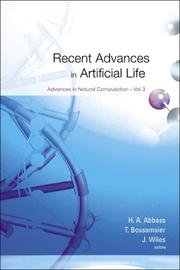| Listing 1 - 2 of 2 |
Sort by
|
Book
ISBN: 3319648160 3319648152 Year: 2018 Publisher: Cham : Springer International Publishing : Imprint: Springer,
Abstract | Keywords | Export | Availability | Bookmark
 Loading...
Loading...Choose an application
- Reference Manager
- EndNote
- RefWorks (Direct export to RefWorks)
This book is open access under a CC BY 4.0 license. This book establishes the foundations needed to realize the ultimate goals for artificial intelligence, such as autonomy and trustworthiness. Aimed at scientists, researchers, technologists, practitioners, and students, it brings together contributions offering the basics, the challenges and the state-of-the-art on trusted autonomous systems in a single volume. The book is structured in three parts, with chapters written by eminent researchers and outstanding practitioners and users in the field. The first part covers foundational artificial intelligence technologies, while the second part covers philosophical, practical and technological perspectives on trust. Lastly, the third part presents advanced topics necessary to create future trusted autonomous systems. The book augments theory with real-world applications including cyber security, defence and space.
Engineering. --- Algorithms. --- Artificial intelligence. --- Computer mathematics. --- Robotics. --- Automation. --- Electronics. --- Microelectronics. --- Robotics and Automation. --- Artificial Intelligence (incl. Robotics). --- Electronics and Microelectronics, Instrumentation. --- Computational Mathematics and Numerical Analysis. --- Algorithm Analysis and Problem Complexity. --- Microminiature electronic equipment --- Microminiaturization (Electronics) --- Electronics --- Microtechnology --- Semiconductors --- Miniature electronic equipment --- Electrical engineering --- Physical sciences --- Automatic factories --- Automatic production --- Computer control --- Engineering cybernetics --- Factories --- Industrial engineering --- Mechanization --- Assembly-line methods --- Automatic control --- Automatic machinery --- CAD/CAM systems --- Robotics --- Automation --- Machine theory --- Computer mathematics --- Discrete mathematics --- Electronic data processing --- AI (Artificial intelligence) --- Artificial thinking --- Electronic brains --- Intellectronics --- Intelligence, Artificial --- Intelligent machines --- Machine intelligence --- Thinking, Artificial --- Bionics --- Cognitive science --- Digital computer simulation --- Logic machines --- Self-organizing systems --- Simulation methods --- Fifth generation computers --- Neural computers --- Algorism --- Algebra --- Arithmetic --- Construction --- Industrial arts --- Technology --- Mathematics --- Foundations --- Computer science --- Computer software. --- Artificial Intelligence. --- Mathematics. --- Software, Computer --- Computer systems --- Trusted Autonomy --- Automation Technology --- Autonomous Systems --- Self-Governance --- Trusted Autonomous Systems --- Design of Algorithms and Methodologies --- Control engineering. --- Control, Robotics, Automation. --- Data processing. --- Control engineering --- Control equipment --- Control theory --- Engineering instruments --- Programmable controllers

ISBN: 1281372749 9786611372743 9812701494 9789812701497 9812566155 9789812566157 9781281372741 6611372741 Year: 2005 Publisher: New Jersey ; London : World Scientific,
Abstract | Keywords | Export | Availability | Bookmark
 Loading...
Loading...Choose an application
- Reference Manager
- EndNote
- RefWorks (Direct export to RefWorks)
Artificial life is now a recognized discipline of research with many important applications and software tools. However, many theoretical issues remain unresolved. This book brings together a cross-section of key developments in artificial life, which in turn gives us new insight into the theory of complex systems. The central ideas of the book surround genetics and evolution in an artificial life framework. Topics covered include maintenance of genetic diversity, hierarchical structures and stability of ecosystems. Underpinning these topics are key theoretical developments surrounding network
Artificial life --- Life --- Mathematical models. --- Simulation methods.
| Listing 1 - 2 of 2 |
Sort by
|

 Search
Search Feedback
Feedback About
About Help
Help News
News